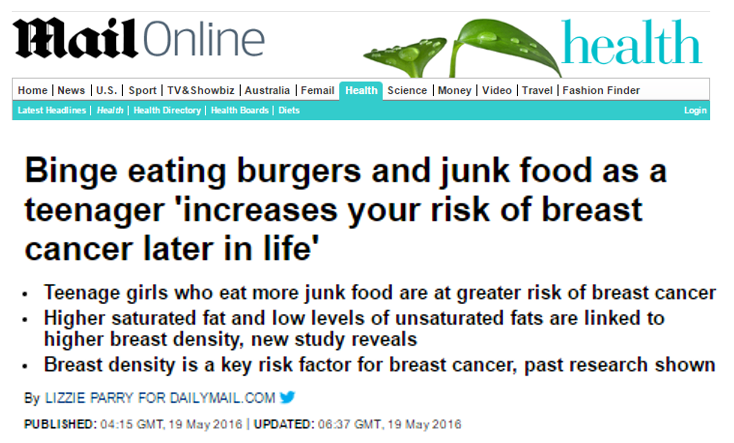|
The Daily Mail is always good for a ‘healthy’ headline and today, it’s the turn of research scientist Seungyoun Jung who suggests that: “Consuming high amounts of saturated fat or low amounts of mono and polyunsaturated fats (vegetable and vegetable seed oils) as an adolescent is associated with higher breast density in young adulthood” I don’t personally know Seungyoun Jung, but I do know that he got his Masters degree at the Harvard School of Public Health Department of Epidemiology in 2008 and went on to get his Doctorate in 2012 in the famous Department of Nutrition. And – here is my mental jump - we all know that Harvard has a history of promoting research which advocates the benefits of vegetable oil. Well, Dr Seungyoun Jung’s latest research is no exception, albeit, it now comes from his current location, the University of Maryland… a bit further South. Statistically, his results are not very significant. Even he admits that “The 5 to 6 percentage point difference is relatively modest” but he goes on to say that this is enough to “increase breast cancer risk as well as promoting obesity, diabetes and cardiovascular disease." Now where have we heard these kind of sweeping associative comments before? … from Dr Willett who heads up the Nutrition department at Harvard, and has been a long-term promoter of the benefits of mono and polyunsaturated industrial seed oils such as those made from corn, sunflower and Canola. His own particular favorite olive oil which he sees as the elixir which brings long-life to the so-called Mediterranean Diet.
Now, I like olive oil too, but as you can read in my book ‘Fat is our Friend’, the hardy inhabitants of Southern Italy, Greece, France and Spain do not have a long history of cooking with olive oil. Until the early part of the 20th century, it was used mostly as a source of relatively smoke-free lamp light and it even fired up olive-oil fuelled furnaces during the cold winters. Besides; when it comes to longevity; the Paris region of France in the North brings you roughly the same life expectancy as you will get in the South, although their diet cannot be really described as Mediterranean. Nor can that of the Northern Germans who get similar results when it comes to lifespan… but putting that to one side. Here’s the thing: Dr Jung’s comments only report on the ‘fatty’ Harvard agenda, but the rest of the world is moving on. The large proportion of starches and sugars combined with stabilizers, colorants and emulsifiers found in junk food are seen elsewhere as major areas of concern. Indeed, according to Jung, “one of the main limitations of the study is that the researchers were unable to rule out whether the significant associations observed for fat consumption during adolescence were attributable to other components in foods that are good sources of different types of fat”. Fat? Why does he only talk about fat? What about those other major components of junk food? The reality is that Dr Jung’s research results do not specifically address the subject of fat, since sugar and the overall content of highly processed carbs were also a major part (probably the biggest) of that so-called fat-rich diet. So can we ascertain anything from his results? Almost certainly, they mean that those who eat a lot of highly processed junk food when they are young have a higher propensity to have denser breast tissue as they age… which may be associated with a higher risk of cancer. Or not. Even that association is in question. According to a study published on August 20 2012 in the Journal of the National Cancer Institute, the risk of dying from breast cancer is not even related to high mammographic breast density in breast cancer patients. The researchers wrote that; "It is reassuring that elevated breast density, a prevalent and strong breast cancer risk factor, was not associated with risk of breast cancer death or death from any cause in this large, prospective study.” Harvard's long arm But the Harvard nutrition establishment has long arms and attempts to push through its agenda of condemning saturated fat whatever the real facts. Getting Daily Mail type headlines that frighten people off consuming butter and cream is part of that agenda. Harvard already has egg on its face after backtracking on the cholesterol/ diet link. As recently as May 2013, the Harvard guidance was: “No matter what your health condition, talk to your doctor before adding eggs back into your daily diet.” How long before those at the Harvard Nutrition Department also must accept that however hard they try to prove otherwise, natural saturated fats such as lard, butter and coconut oil are indeed the healthier option. And much, much healthier than the industrially prepared poly-unsaturated oils which they advocate. http://medicalxpress.com/news/2012-08-breast-density-cancer-death-patients.html http://www.health.harvard.edu/staying-healthy/harvard-study-says-yes-to-eggs
1 Comment
|
Sammy Pepys"FAT IS OUR FRIEND" ADVOCATES A DIET: Sammy Pepys was the pseudonym used by James Capon when writing this book. He is not a doctor or a nutritionist but has studied nutrition and holds an MPH from Edinburgh University. Over the years, he has become increasingly suspicious of today's conventional wisdom about diet and health. When it comes to what we eat, he has helped many learn to eat more healthily.
Archives
May 2020
CategoriesArchive
|
||||||||||||||||||||||||
| 1_blog_march_2014.docx | |
| File Size: | 546 kb |
| File Type: | docx |
| 2_blog_april_2014.docx | |
| File Size: | 245 kb |
| File Type: | docx |
| 3_blog_may_2014.docx | |
| File Size: | 642 kb |
| File Type: | docx |
| 4_blog_june_2014.docx | |
| File Size: | 426 kb |
| File Type: | docx |

 RSS Feed
RSS Feed